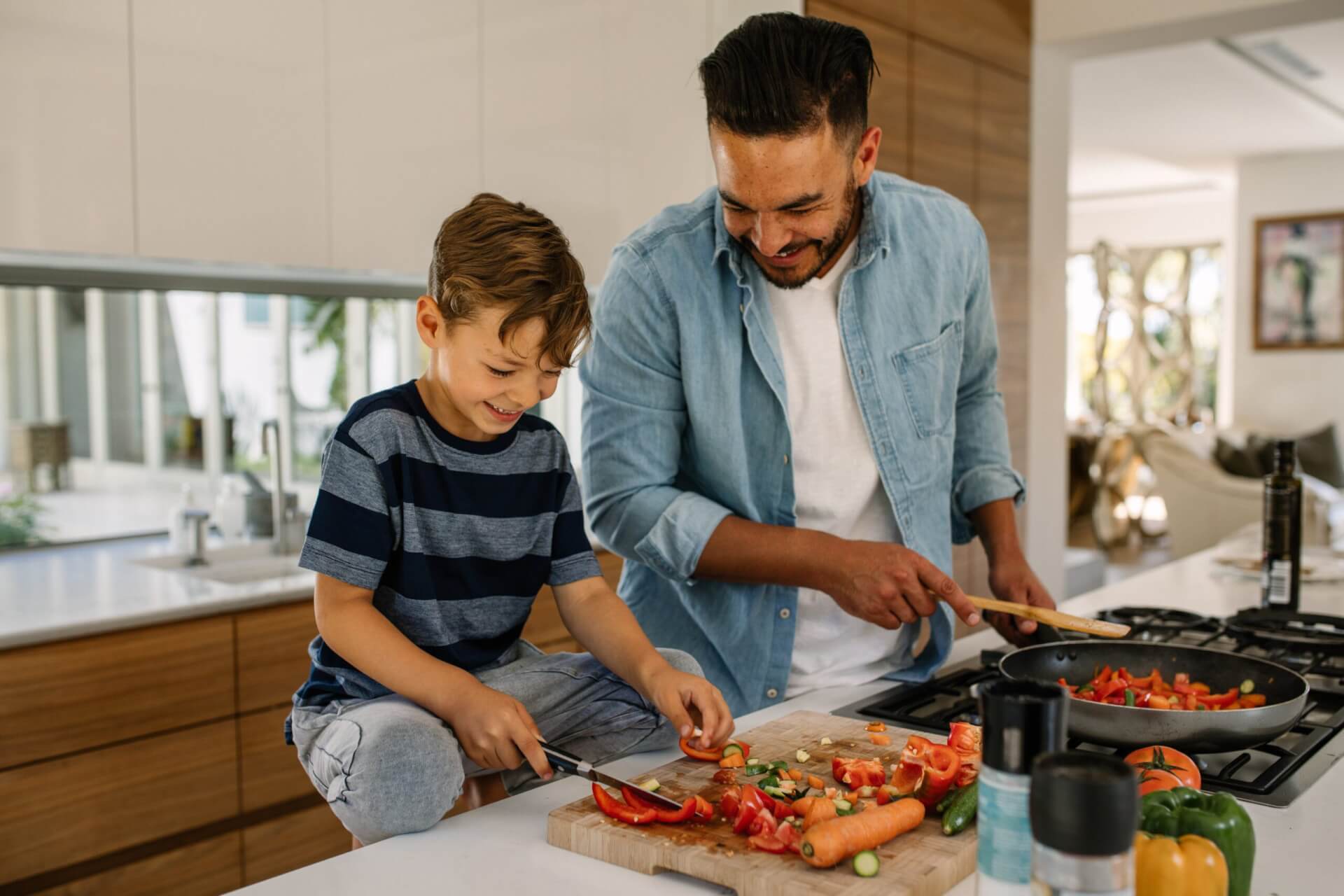
Kick-start your kids’ healthy eating habits by encouraging them to join you in the kitchen.
He holds the warm egg in his hands that he just helped me boil on the stove, taps it on the edge of a bowl and begins to de-shell the fascinating shape. He requires a little assistance to get off all the remaining fine bits that his little pudgy fingers have missed. Then with a grin that would rival the Joker’s, he devours the egg in a few mouthfuls, rubbing his belly gleefully before saying, “Judey make another egg?”
Don’t let Jude’s zeal fool you though. The inevitable happened to us as well. I thought my adventurous son with a palate to match was different to the norm. At around two-and-a-half, he became fussy about food for no particular reason other than to assert his independence, like every other toddler come threenager. “No” to mushrooms, “I don’t like broccoli”, and the one that made my heart sink, “Yucky” to sauerkraut, which he once consumed by the spoonful, delighting not only me, but his gut flora too.
When lockdown 1.0 was in full swing in 2020, I, like every other parent, searched for creative ways to entertain while teaching Jude valuable lessons from the sanctuary of our home. Among building tepees, having tea parties, gardening and composting, practising yoga, painting gift cards, and making decorative bird feeds, we cooked. Jude became our resident sous-chef and each time we prepared a meal, he voluntarily manoeuvred his stair tower to the kitchen bench to help (unless Bluey was on, of course). I quickly realised that cooking together was far more than a inventive pursuit to pass the time – it was an opportunity to teach him healthy eating habits, expose him to a variety of different foods, give him the space to feel independent in the creation of a meal, bond together as a family over smells, tastes, and textures, practise patience (his, and mine!) and inject a few math lessons along the way.
Amy Palanjian is the creator of Yummy Toddler Food, a website for families with little kids, and the author of Busy Little Hands: Food Play!. She remarks that it can be fun and so much less pressure to have kids help in the kitchen. “Learning about foods away from the table is often less intimidating to the kids (since there’s no pressure to eat) and it can build knowledge of ingredients that, over time, can help kids become more confident to actually try them. Plus, it can just be a fun thing to do together.”
She does assert however, that there is a right time and place for cooking with your children and not every meal will be appropriate. “Save cooking with kids for times when you really can focus on it and aren’t trying to multitask. Then give the kids specific jobs like washing the lettuce, breaking off broccoli florets or helping to safely chop something or stir ingredients. Patience is key because kids are still learning and things will likely get messy, so remember the goal is never perfection; it’s the experience.”
Luka McCabe is a mother of three from Newcastle, NSW, and the founder of Boob to Food, a website with resources dedicated to guiding, inspiring and nourishing mothers and babies on their journey from boob to food. She is also a midwife, nurse, birth and parenting educator, and a certified nutrition consultant specialising in postpartum and babies’ nutrition.
“My passion lies with nutrition for mothers and children, as I truly believe if we set up good foundations at an early age, we will avoid bad habits later in life – and in turn, hopefully avoid the many preventable diseases now prevalent in our society. I also believe that if a mother models healthy eating habits, her children will want to follow suit.”
I’ve turned to Luka countless times for support and advice to ensure Jude is receiving a nutrient-rich diet, but of course, that in itself comes with its own set of challenges when your little one is almost three. Luka shares with her thriving online community her top tips for navigating the fussy period:
- Let the kids help! It is messy and painstakingly slow, but the benefits are worth it. Allow them to pick the meal that night, help set the table, get the food you need out of the fridge, pick herbs from the garden, and wash the fruit and vegetables.
- Eat meals together as a family whenever possible. Our children want to do what we do, and eat what we eat. By modelling acceptable eating behaviours and enjoying nourishing foods, your children will hopefully reciprocate.
- Minimise distractions. Turn off the TV and put away other devices.
- Eat the same food. Separate meals are not only time consuming, but can also set up unhealthy eating habits as they will start to think of foods in different ways.
- Offer share plates. Your child can help themselves to their portion, which plays to their independence, but really, all the proponents of the meal are still healthy.
- Bring forward dinner. If your child is always refusing dinner, don’t give them afternoon tea and have dinner earlier. They’re probably still full.
- Keep meal times calm. Sometimes they are just going to refuse to eat something and this is OK. Try to stay calm.
- Don’t replace it. Never force your child to eat a meal, but also don’t give any other options. In saying that, don’t offer them something you know they are going to hate, and be sure to offer some safe foods that you know they like. If they refuse them all, well that is their choice. Your job is to offer food; it is their job to decide whether or not they eat that food.
- Keep offering it. It can take up to 15 exposures of a food to really identify if your child likes it or not.























